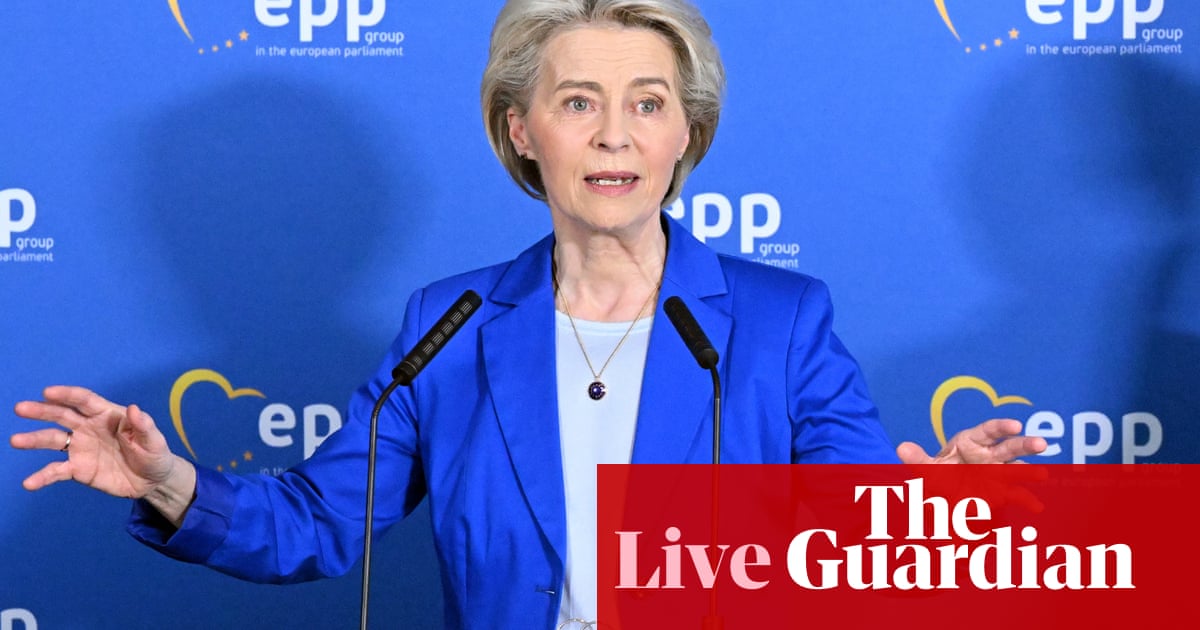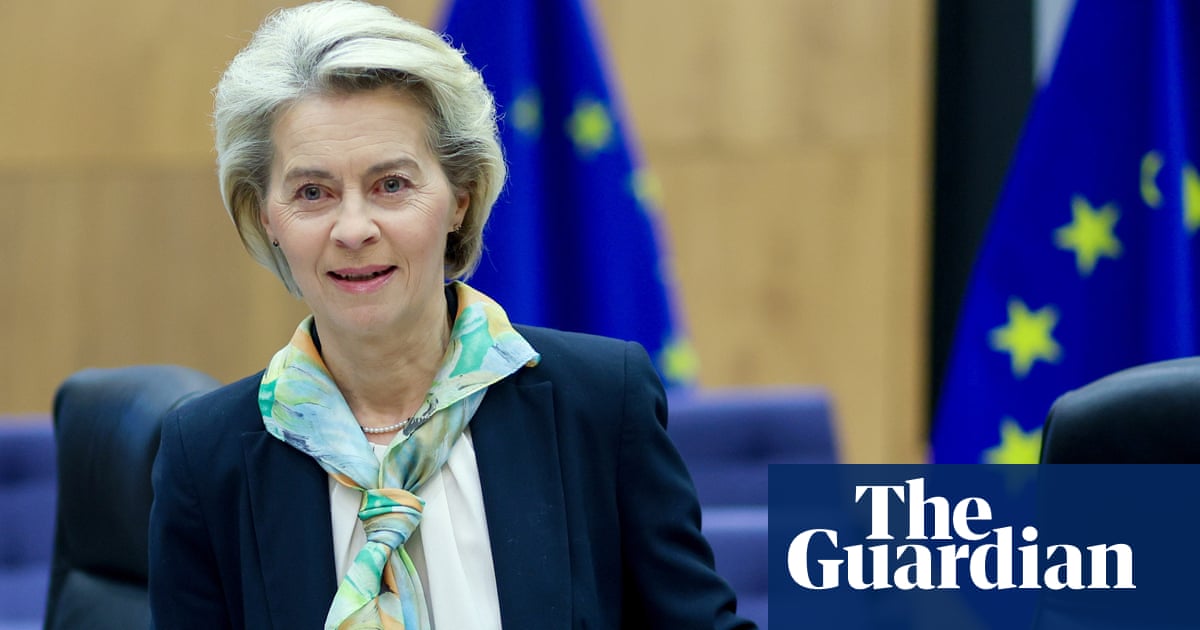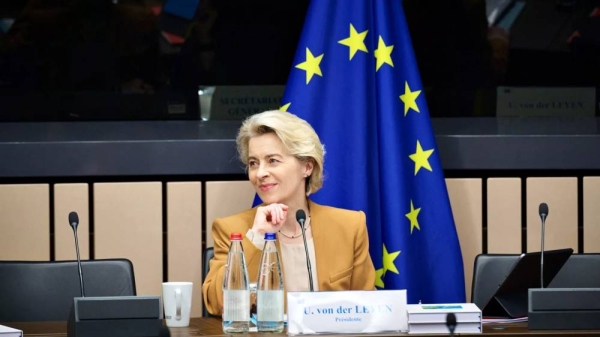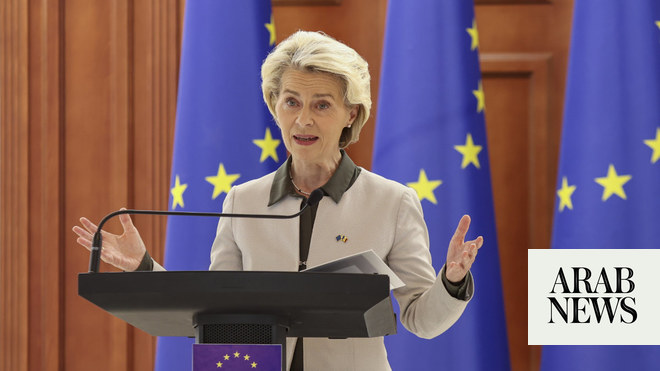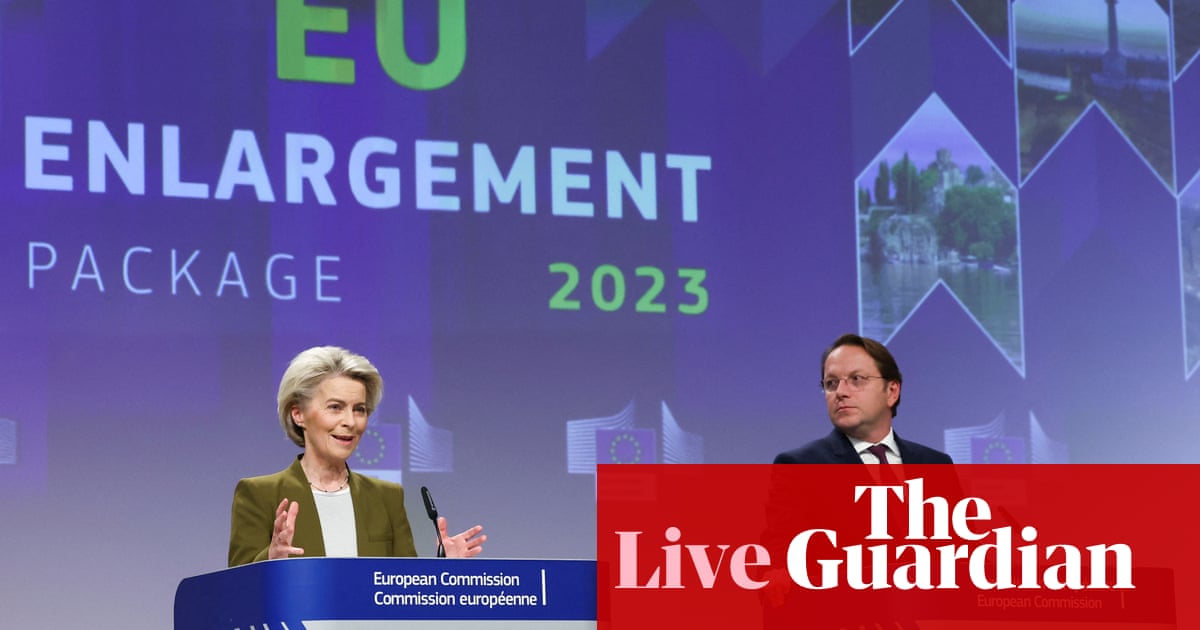
Enlargement in "common interest", Von der Leyen tells EU parliament
Speaking at the European parliament this afternoon, the EU Commission president, Ursula von der Leyen, said “there’s a new sense of urgency to unite our European family”.
Today it is clear that the stability of every country in our continent affects, of course, also our own stability. Their security is our security. And if our union isn’t fast enough in bringing candidate countries closer, others will fill the vacuum.
But it is in our geopolitical interest to complete our union, to make it stronger than ever.
And it’s not only about geopolitics. It’s of course also about economics. The completion of our union will make the new member states’ economies grow, it will make EU companies grow, it will also make our single market grow, making Europe an even more attractive and stronger partner in the global stage.
Prosperity is not only shared by enlargement, it is multiplied. Enlargement is in our common interest. So we must seize this moment of opportunity to advance as much as possible towards the completion of our union.
Summary of the day
The European Commission took the historic step of formally recommending to member states that they should open EU accession negotiations with Ukraine and Moldova.
The commission also said it recommended that the council adopt so-called negotiating frameworks for Ukraine and Moldova once they had adopted certain key measures.
For Georgia, the commission recommended the status of a candidate country but on the understanding that a number of steps were taken.
In the complex case of Bosnia and Herzegovina, the commission said it recommended the opening of accession negotiations “once the necessary degree of compliance with the membership criteria is achieved”.
The commission said Serbia needed to improve its alignment with the EU’s common foreign and security policy, including when it came to Russia.
The Ukrainian president, Volodymyr Zelenskiy, said following the commission announcement that “this is a strong and historic step that paves the way to a stronger EU with Ukraine as its member”.
Dmytro Kuleba, Ukraine’s foreign minister, said in an emotional post that “our fight and sacrifices are not in vain”.
Nicu Popescu, Moldova’s foreign minister, wrote on social media that the commission’s recommendation “is a testament to our progress”.
Germany’s foreign minister, Annalena Baerbock, said that the people of Ukraine belonged to the European family and that a stronger, larger and united EU was the geopolitical answer to Russia’s war of aggression.
The commission president, Ursula von der Leyen, warned in a speech to the European parliament that “if our union isn’t fast enough in bringing candidate countries closer, others will fill the vacuum”.
The European parliament president, Roberta Metsola, wrote that “an enlarged EU means a stronger EU”.
Elina Valtonen, Finland’s foreign minister, emphasised that “merit-based enlargement makes the union more prosperous and resilient”.
Romania’s president, Klaus Iohannis, called today’s moves “fully deserved recognition of their comprehensive reform efforts”.
The recommendation that the EU opens accession talks was described by the EU Commission as “unconditional”, puzzling reporters. Officials insisted the “unconditional” and “preconditions” are reconcilable as the reforms they are talking about are mere “leftovers”.
Ivanna Klympush-Tsintsadze, chair of the Ukrainian parliament’s committee on integration to the EU, said that Ukrainians were happy with the European Commission’s move today, but also cautioned that accession should not be dependent on EU internal reforms.
Adnan Ćerimagić, a senior analyst at the European Stability Initiative, said that when it came to Bosnia and Herzegovina, “with a wording of today’s recommendation, the European Commission found an elegant way to balance between expectations of different actors involved”.
Enlargement in "common interest", Von der Leyen tells EU parliament
Speaking at the European parliament this afternoon, the EU Commission president, Ursula von der Leyen, said “there’s a new sense of urgency to unite our European family”.
Today it is clear that the stability of every country in our continent affects, of course, also our own stability. Their security is our security. And if our union isn’t fast enough in bringing candidate countries closer, others will fill the vacuum.
But it is in our geopolitical interest to complete our union, to make it stronger than ever.
And it’s not only about geopolitics. It’s of course also about economics. The completion of our union will make the new member states’ economies grow, it will make EU companies grow, it will also make our single market grow, making Europe an even more attractive and stronger partner in the global stage.
Prosperity is not only shared by enlargement, it is multiplied. Enlargement is in our common interest. So we must seize this moment of opportunity to advance as much as possible towards the completion of our union.
Commission balancing on Bosnia, analyst says
The European Commission said today that it recommends opening EU accession negotiations with Bosnia and Herzegovina once the necessary degree of compliance is achieved.
We asked Adnan Ćerimagić, a senior analyst at the European Stability Initiative, about this.
“With a wording of today’s recommendation, the European Commission found an elegant way to balance between expectations of different actors involved,” he said.
The analyst added:
Sarajevo, and its EU friends in Vienna, Ljubljana and elsewhere, expected [the] country to start EU accession talks by the end of this year, while key EU capitals like Berlin, expressed enormous scepticism and opposition.
In a way, today the commission opened a door for accession talks with Bosnia-Herzegovina but avoided testing decisiveness of the sceptic member states. So before asking them, it decided to ask Sarajevo to deliver more.
But, he noted, “while from Brussels’ point of view this might be a pragmatic and obvious solution, it has its risks”.
Sarajevo, Ćerimagić said, “has overall been asked by the EU to deliver much, much more than Moldova, for example”. He said:
Asking those in the current government, who since January this year consistently championed the EU path, to deliver more reforms, in terms of Bosnian and Herzegovinian political reality means also to ask them to make more difficult compromises with Milorad Dodik. The same politician whose political agenda is sanctioned by Germany, which as said was very sceptical about the start of accession talks.
Nevertheless, he added, “even if the EU at one point soon decides to start accession talks with Bosnia and Herzegovina, nothing fundamental will change since those who have been negotiating for over a decade, like Montenegro, are still years away from being prepared or joining the EU”.
And, the analyst said, the “EU has failed to create and offer incentives, such as full membership in the EU single market, that would in the meantime make reforms and progress more likely or worthy the efforts”.
EU reform process should not hamper membership, Ukrainian politician says
Ivanna Klympush-Tsintsadze, chair of the Ukrainian parliament’s committee on integration to the EU, told us today that Ukrainians are happy with the European Commission’s move today, but also cautioned that accession should not be dependent on EU internal reforms.
In a phone interview, Klympush-Tsintsadze said:
I think it’s a pretty widely shared feeling here in Ukraine that we are happy to see the recommendation from the European Commission for the council to take the decision on the start of negotiations already this year. And yes, we do understand that it also has … additional recommendations before the actual start of negotiations.
But I hope that there is a clear understanding across the political spectrum in Ukraine, that this is an absolutely historic chance for the state and the people of Ukraine to fulfil their strategic goal and strategic dream, if you wish. So therefore, it is – from my perspective – it is seen as a very, very positive signal.
The chair noted that “obviously, we do understand that it’s not even a done deal with the decision of the European Council” and that there are “different winds”, which mean there is a need for “a very serious mobilisation both on the side of the European institutions and those member states who do want to ensure that this decision has to be taken already this year”.
And when it comes to what is next, the politician added:
With regard to the next stages, we are in close communication with … our partners from different countries, and we do hear very well that there are serious concerns from some politicians with regard to whether it will be possible to decouple the process of internal reform in the EU from the European integration aspirations of all those countries that are right now in their candidate status or on the way to open the negotiations or conducting the negotiations.
And I think that this is incredibly important, that we decouple and make sure that these processes are going in parallel, and if the country will be done with its internal tasks, that no internal processes in the EU would hamper that final decision on the full-scale membership.
Plus, she noted, other challenges can come up during the process:
The challenges of the time require very serious mobilisations both internally in those states who are aspiring to membership but also among those who are inside the EU, understanding that this is also about their geopolitical and geo-economic future as well.
Bosnia leader thanks EU, says country "must fulfil" obligation
Borjana Krišto, chair of the council of ministers of Bosnia and Herzegovina, thanked the European Commission “as well as all our friends within the EU for deciding to believe in BIH and for supporting the recommendation to open negotiations, bearing in mind that we in BIH must fulfil our obligation without any delay”.
An Irish member of the European parliament, Deirdre Clune, a member of Fine Gael, said that it was time for accession negotiations with Ukraine to begin.
“Every day, Ukrainians show us what they are fighting and for. They are fighting for their future, for a Ukraine free from Russian aggression,” Clune told the Irish Times.
People of Ukraine belong to European family, says German minister
Germany’s foreign minister, Annalena Baerbock, said today that the people of Ukraine belong to the European family.
The start of EU accession talks, she added, was the next step.
A stronger, larger and united EU is the geopolitical answer to Russia’s war of aggression.
Ilhan Kyuchyuk, a Bulgarian member of the European parliament from the Renew Europe group, praised the European Commission’s recommendations today but said he insists that the commission “not … leave the countries from the western Balkans, whose citizens have been living with the European dream and aspiration for a decade”.
Tonino Picula, a Croatian member of the European parliament from the Socialists and Democrats group, has criticised parts of the European Commission’s report.
Speaking at a meeting of the parliament’s foreign affairs committee, he said “appeasement policy toward Serbia and relativising its action must end because it brought us nowhere and has a spillover effect on the rest of the region”.
Reinhard Bütikofer, a member of the European parliament from the German Greens, has questioned if Europe can be sure Serbia’s leadership is committed to choosing the path of democracy.
Conditional or unconditional?
The recommendation that the EU opens accession talks was described by the EU Commission as “unconditional”.
It could be argued that this is as much about politics and boosting morale in Ukraine as it is about process.
Both Ukraine and Moldova have been given preconditions that they must complete reforms before the negotiating framework will be adopted. This is expected in March.
It was a hot topic at a press briefing in Brussels, with Ukrainian journalists, in particular, puzzled by the statements.
How can it be unconditional when you set conditions?
Officials insist the “unconditional” and “preconditions” are reconcilable as the reforms they are talking about are mere “leftovers” from the cluster of reforms both countries had to undertake – for example, giving an anti-corruption authority in Kyiv more powers to revisit conflict of interests of public servants should evidence support further investigations.
The EU now has an opportunity “to become a larger geopolitical force”, Latvia’s foreign affairs minister, Krišjānis Kariņš, said today.
He added:
By expanding the number of member states, we will be strengthening democratically based rule of law in Europe. I strongly support the enlargement package presented by the European Commission today.
Recommendation for Ukraine and Moldova "fully deserved", Romanian leader says
Romania’s president, Klaus Iohannis, said he welcomes the “historic” recommendation to open accession negotiations with Moldova and Ukraine, calling the move “fully deserved recognition of their comprehensive reform efforts”.




